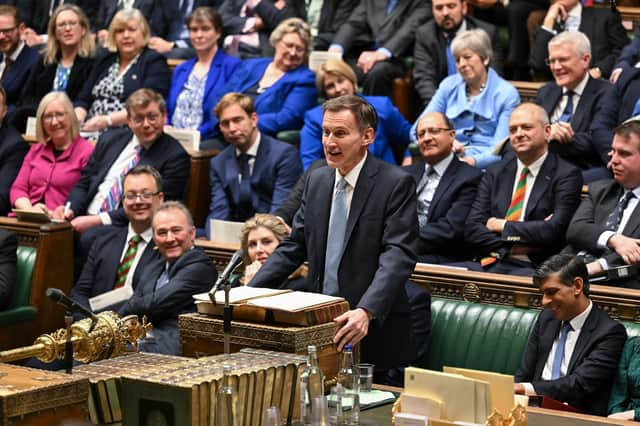Owen Polley: Stormont is still blaming London for all our financial difficulties


In the build up to the chancellor’s statement, there were rumours that Rishi Sunak would decide to go to the country in May, but it seems likely that we will vote during the autumn.
This Tory government, in the popular imagination, is generally considered uncaring, rapacious and rash. Its opponents allege that it looks after the interests of the rich and pushes less well off people into poverty. It is often accused of making irresponsible decisions that it believes might result in some political advantage.
Advertisement
Hide AdAdvertisement
Hide AdSet against those perceptions, Jeremy Hunt’s budget was remarkably moderate. The chancellor had an opportunity to tell an eye-catching story ahead of the election, casting the Conservatives as the party of business and low taxes. Instead, his announcements could almost have been made by a centre-left government. The headline initiative was a 2 pence reduction in national insurance but there was no increase in workers’ personal allowances (the level at which people start paying income tax). Not long ago, raising that threshold was essential to almost every Tory budget.
The chancellor made it easier for middle-income families to gain child benefit and pledged an extra £6 billion for the NHS. Meanwhile, his revenue raising initiatives were aimed at foreign ‘non-doms’, who avoid taxes on income they make abroad, and gas and oil companies.
It was Mr Hunt’s colleagues on the Conservative right who were disappointed with these decisions.
They claimed that his policies could dissuade entrepreneurs from coming to Britain and hamper efforts to bring down energy prices. They also bemoaned the fact that taxes were set to reach their highest level, compared to the overall economy, since 1948.
Advertisement
Hide AdAdvertisement
Hide AdThat’s because the government is still spending enormous sums of money on stretched public services and paying back huge debts run up during its response to Covid. Given the pre-election timing, and our economy’s problems, though, this budget was cautious, even boring. Indeed, there is a legitimate argument that it was too timid.
Many Conservatives believe that the government should focus on cutting taxes, letting people keep more of their own money and encouraging them to spend more. The Office for Budget Responsibility, whose analysis formed part of the chancellor’s statement, revealed that our economy is expected to grow only because of immigration, but as individuals we are likely to get poorer.
In addition, the influx of newcomers means that the government is forced to put ever greater sums into public services, without any improvement in standards.
Of course, not everybody accepts that cutting taxes, or reducing public spending, is the solution to these problems. Liz Truss was savaged, during her brief spell as prime minister, for trying to boost the economy by spending more and cutting tax.
Advertisement
Hide AdAdvertisement
Hide AdThese are difficult issues and while Westminster struggled to find persuasive answers, there was no point turning to Stormont for greater wisdom. The responses to the budget from most of the local parties were almost juvenile in their simplicity.
If anything, their idea was simply that the chancellor should cut tax and increase public spending at the same time. It came closer to ‘Trussonomics’ than mainstream thinking.
In Northern Ireland, Mr Hunt’s spending increases will bring £100 million more for the block grant. Given that the NHS was provided with an extra £6 billion nationally, a substantial amount of that money would be expected to go into our health service.
Unfortunately, as the economist Dr Esmond Birnie pointed out in the News Letter last week (March 7), the health department already claims that it needs an extra £400 million per year to ‘stand still’ (i.e. provide the same quality of service that it does currently). He urged the executive to show ‘political courage’ by implementing long-delayed reforms that could streamline our NHS and make it more effective, but there are as yet few signs that any such changes will be delivered.
Advertisement
Hide AdAdvertisement
Hide AdWhen Sinn Fein was asked whether it supported both cutting taxes and spending more, the finance minister, Caoimhe Archibald, gave a vague reply about progressive taxation. That was a way of reassuring voters that someone else would pay. In other words, it was not a serious argument. None of the executive parties, including the DUP and UUP, chose to linger on the revelation that the Northern Ireland protocol prevented Mr Hunt from exempting more businesses from VAT. The EU’s rules meant this important measure would not have been allowed in Northern Ireland, so the chancellor stayed within Brussels’ rules.
This iteration of Stormont, which we keep being told represents a new beginning, has so far been marked by a lack of honesty about trading barriers with Great Britain as well as a lack of realism about finances.
Nobody would claim that the UK’s economic picture is currently ideal, although it is certainly no worse than the situation in much of the rest of Europe. At best, we are struggling to contain our national debt, while people become less well off than before.
The Westminster parties are wrestling with these problems, but they are ultimately required to assume responsibility and take difficult decisions. The budget this time was uninspired, but it at least attempted to balance rewards against possible risks.
Advertisement
Hide AdAdvertisement
Hide AdThe executive is due to deliver its own budget and a ‘programme for government’ over the next few weeks. Don’t expect a realistic assessment of Northern Ireland’s finances in either of those documents. It remains much easier to blame Westminster for our difficulties.